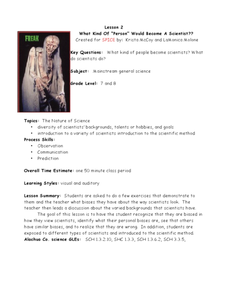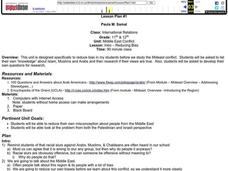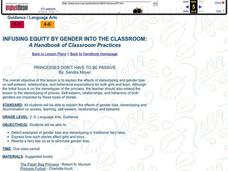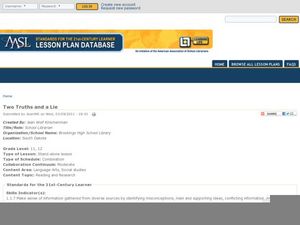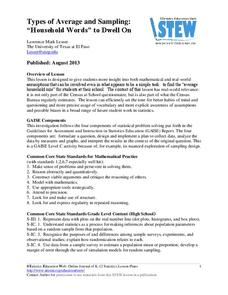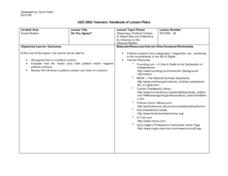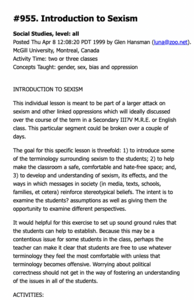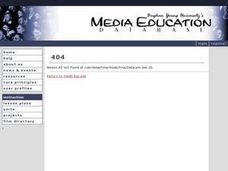Curated OER
What Kind of "Person" Would Become a Scientist?
"Scientist Stereotypes" could be another name for this lesson! Begin by drawing from middle schoolers' preconceived notions and media portrayal of scientists, and then explain that anyone can be a scientist. Even though there is an...
Curated OER
Reducing Bias
Students begin their examination on the conflict in the Middle East. Before beginning, they complete a survey and discuss their answers to hopefully reduce their bias about the region. They examine the problem in the Middle East from the...
Curated OER
Using Picture Books to Teach the Holocaust
Learners compare a photo of a child's room during the Holocaust to their room. In this WWII lesson, students read picture books and evaluate the roles of characters in the book. Learners create either a poster about the roles, a movie...
Curated OER
Courage of the Heart
Students research discrimination and how people fought against for the common good. In this discrimination lesson, students watch a movie about Alfred Blalock and Vivien Thomas. Students generate a list of words about discrimination....
Curated OER
Princesses Don't Have to be Passive
Students rewrite a fairy tales to eliminate any gender bias that occurs in the original fairy tale. In this gender bias lesson plan, students also discuss how gender bias effects self esteem, relationships, and behaviors.
Curated OER
Two Truths and a Lie: Internet Research Skills
It's tough for high schoolers to assess what is a credible resource and what is not. A helpful resource prompts class members to research a particular topic and record two facts—and create one lie—while documenting the sources. They...
Curated OER
News Journalism Across the Media: Introduction
Although students are aware of news as information that influences their perceptions of the world, they are often unaware of the various ways to present that information. Encourage them to investigate, discuss, analyze and make valuable...
Statistics Education Web
Types of Average Sampling: "Household Words" to Dwell On
Show your classes how different means can represent the same data. Individuals collect household size data and calculate the mean. Pupils learn how handling of the data influences the value of the mean.
Teaching Tolerance
Community Puzzle Mural
Every piece of the puzzle is important. A lesson gives individuals the opportunity to create artwork that spreads a message of inclusion and tolerance. Class members work in teams to create pieces of the mural that form a larger picture....
Curated OER
Understanding Treaties: Students Explore the Lives of Yakama People Before and After Treaties
Students analyze treaties made between the US government and Native American tribes. In this government lesson, students evaluate bias emotionally connect with what was gained and lost during the late 1700's. This is a 3 part lesson...
Curated OER
Do You Agree?
Students recognize bias in a political cartoon, evaluate how the media uses both positive and/or negative political cartoons, and assess the influence a political cartoon can have on a person.
Curated OER
Stereotypes
Assumptions and misconceptions are two things that underlie stereotypes. Introduce youngsters to the concept of stereotyping with a role-play activity. They pretend they are employees at a restaurant who have accused a person of...
Curated OER
World War I
Eleventh graders investigate propaganda used during World War I. In this World War I lesson, 10th graders examine propaganda from the war and analyze war posters. Students then create their own propaganda posters on listed topics.
Curated OER
Understanding the Influence of the Media
Critically analyze advertising techniques, such as circular reasoning, bandwagon, testimonial, and repetition, with worksheets that effectively discuss and illustrate how the media aims to influence.
Curated OER
Teaching Strategies for the Social Studies Classroom
Engage your class in a lesson that is concerned with the development of skills in the realm of teaching strategies needed for Social Studies. They will participate in delivering content using several strategies that are demonstrated by...
Curated OER
'And Maybe I Can Change That Too'
Students consider their own prejudices and stereotypes. In this social justice lesson, students monitor their own reactions to people who are different from themselves. Students watch a video featuring Toni Morrison that presents a...
Curated OER
Progressive City Planners
Students plan cities. In this environmental racism activity, students design imaginary cities taking into consideration the amenities and environmental hazards that exist. Students discuss city planning challenges.
Curated OER
Introduction to Sexism
Students develop an understanding of sexism, its effects, and the ways in which messages in society (in media, texts, schools, families, et cetera) reinforce stereotypical beliefs.
Curated OER
Students Press Law and Ethics
Students research the rights and the responsibilities of journalists in dealing with First Amendment issues. In this First Amendment lesson plan, students research the Alien and Sedition Acts and study the five elements of...
Curated OER
Friar Margil and the Spanish Missions
Students examine the concepts of diversity and assimilation. They identify the validity of sources and recognize bias, and create original illustrations from the students' point of view which show the impact of the Spanish friars on the...
Curated OER
Who Was Cinque?
Students examine the Amistad revolt and its significance in the American debate over slavery. They review and discuss period newspaper reports about the revolt.
Curated OER
Cleveland may gamble on gambling
Students write a news feature or editorial discussing the debate of whether gambling should be legalized in Cleveland. Students research and debate about the issue. Students interview community members to hear views.
Curated OER
Phenomenology Lesson Plan #5: Character Part 2
Students examine the meaning of the word icon as it relates to media and pop culture. They watch and discuss film clips, write a mini-biography, take a Film Icon Quote quiz, and write a written response to the film clips.


